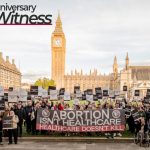
Record Numbers Unite To Say Abortion Isn’t Healthcare!
This year March for Life UK was back bigger and better than ever for its tenth anniversary, drawing crowds of 8-10,000 with the message: abortion isn’t healthcare.
The doors of the Emmanuel Centre opened at 10am and by the time I arrived half an hour later it was already packed with pro-lifers and buzzing with anticipation. A small group of anti-life protesters were gathered opposite the front entrance chanting, ‘This is what feminism looks like’; I must say, it did not look terribly appealing!
While in the hall representatives of a variety of pro-life groups welcomed visitors, distributing badges and signs, the kids’ face painting and placard making competitions took place downstairs. At 10:30 in the auditorium the Pro-Life Health Summit got underway with talks from Dr Calum Miller, doctor and philosopher specialising in medical ethics, and Ira Winter of Fiat Fertility Care. As per the theme of this year’s march, the talks expressly challenged the notion that abortion is healthcare.
A panel followed featuring Dr Haywood Robinson, physician, former abortionist and now 40 Days for Life campaigner, Kevin Duffy, former director and consultant for Marie Stopes International (MSI), and Adam Smith-Connor, a post-abortive father who previously assisted with abortions during his army medical training.
Dr Haywood shared the story of his early calling to medicine, which took a turn when in the 1970s he was trained (in part by the woman he would later marry) to perform abortions, which at the time were ‘mechanical’ and ‘could be completed in around ten minutes’. Both he and Kevin shared their insider experience of the abortion industry – or, as Dr Haywood calls it, the ‘abortion cartel’ – and the takeaway in both cases was that abortion is treated very much as a business.
According to Kevin, during his years working for MSI he witnessed abortion propaganda change ‘quite dramatically’. Early in his career the focus of MSI, the World Health Organisation and others was on presenting ‘comprehensive, safe abortion care’, but by around 2016 the push for higher numbers of abortions intensified. The strategy from that time onwards he characterised thus: ‘If we want to satisfy our donors, who want higher numbers, then self-managed abortion is the way to go.’ According to Kevin, the COVID-19 lockdowns provided an opportunity for the abortion lobby, and ‘in 2020 we saw that global strategy come right here (to the UK).’
Adam not only shared about his experience working with women having abortions but was also able to provide the other side of the equation, having paid for the abortion of his own child prior to his conversion to Christ (as well as having had a miscarriage). He brought the reality home, pointing out his two surviving children in the auditorium, saying, ‘My two children are here, but the reality is that I’ve got four children.’ He summed up: ‘Calling abortion healthcare because it involves doctors and drugs is like calling the death penalty healthcare because it also involves doctors and drugs.’
The panel was followed by a Q&A session with medical professionals from various healthcare fields. Discussions ranging from the coercion reported by many post abortive women to the refusal of the abortion industry to acknowledge women who change their minds. The final stirring speech was from Dawn McEvoy of Both Lives Matter after which it was time to prepare for the march!
A thousand or so of us poured out of the Emmanuel Centre to meet many thousands more of our fellow marchers on Tufton Street, the majority armed with signs and banners. As we set off, medieval Latin chants mingled with modern worship songs and even a pro-life rendition of Twinkle, Twinkle, Little Star! In attendance were, among others, five Catholic bishops, many priests, friars and nuns, Orthodox Christians for Life, and Protestants from both high church and low as well as a pro-life atheist group.
As always, we marched up past Parliament and looped back to Parliament Square, where this year the stage was topped with a huge screen. The same little band of protesters from earlier awaited us, though their chants could not contend with the lively band on stage and their speakers struggled to be heard.
A musical interlude as marchers filed into the square was followed by speeches. Dr Haywood took to the microphone once again, opening with the chant, ‘Pro-choice? That’s a lie! Babies never choose to die!’ and closing his remarks by reminding the crowd of the words of encouragement offered by Winston Churchill to Britons in their fight against another eugenicist movement, national socialism: ‘We shall fight on the beaches, we shall fight on the landing grounds, we shall fight in the fields and in the streets, we shall fight in the hills; we shall never surrender.’
Next up was March for Life’s own Isabel Vaughan-Spruce, who spoke of the growing public consciousness of two-tier justice in modern Britain, pointing out that far from being new or unpredictable, this insidious injustice starts with the dehumanisation of certain demographics, most egregiously the unborn. She said, ‘Our most basic form of justice must apply to all or it ceases to be justice and becomes selective privilege. Life is not a privilege to be earned but a gift bestowed on us at conception by Almighty God.’
To bring proceedings to a close on a personal note, we heard two testimonies, the first from post-abortive father, Angel. Angel told the story of his son, conceived while he and his partner were students in Mexico City, only for the mother of his child to choose abortion. He described the powerlessness he felt as doctors referred to his child as ‘the product’, the workaday way in which his little one was killed, and the depression and guilt he felt in the aftermath. But for all his suffering, Angel’s message was clear:
‘I know I can’t make abortion go away or see my child’s smile with these words, but if I can stop a single abortion from happening, I will repeat it as many times as necessary: abortion is not healthcare.’
The final speaker of the day was Claire Culwell, a survivor uniquely able to voice the seldom heard abortion victim’s perspective. Having grown up in an adopted family, a young Claire made contact with her birth mother, who revealed that not only was Claire a survivor of a surgical abortion, but that she had a sibling, a twin who sadly did not survive the procedure which had left Claire with a club foot and a dislocated hip at birth. Claire recognised the pressure that her then 13 year old mother had been under and reconciled with her. She then encouraged the crowd to ‘get uncomfortable’ for the sake of healing and the right to life, because ‘(the pro-life movement) is saving lives and creating a culture which values life from conception to natural death.’
The day ended with a prayer led by representatives from different Christian denominations and more music as people said their goodbyes and drifted off home. Another year for a growing movement, another peaceful march in the footsteps of Wilberforce and the abolitionists, another worthy witness to the right to life of all human beings here in Great Britain and the world over. Bring on 2025!
Theo Wilmot – March for Life UK Communications Officer


